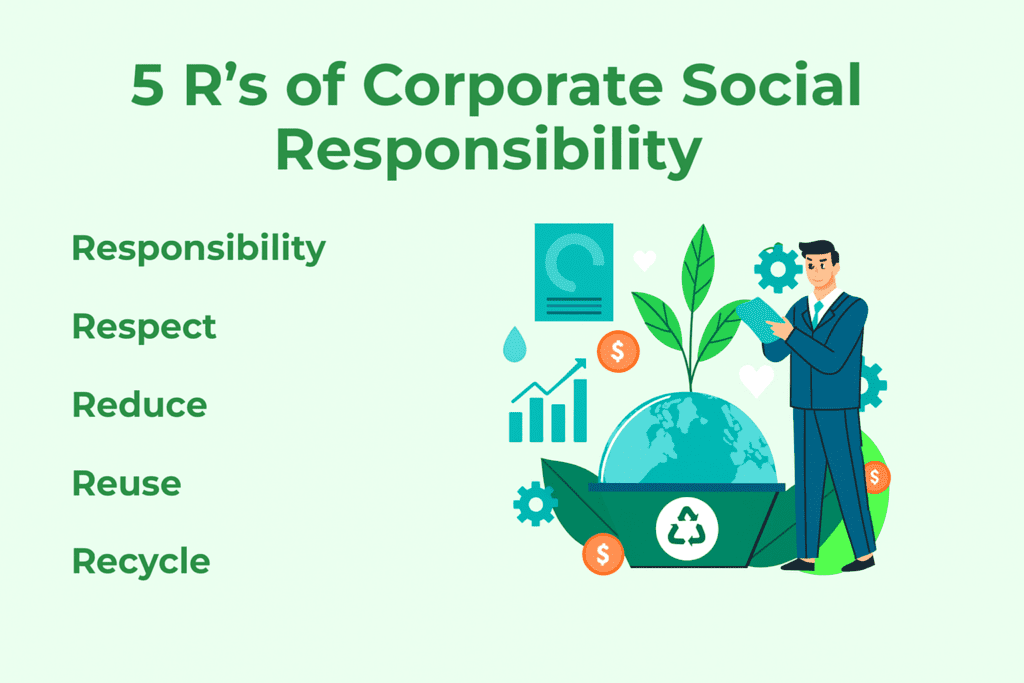Corporate Social Responsibility (CSR) has become more than just a buzzword—it’s a core part of how modern businesses operate. Today, companies are expected to go beyond profit-making and actively contribute to sustainability, ethical practices, and social welfare. One framework that helps guide this responsibility is the 5 R’s of CSR, also known as the 5 R’s of corporate social responsibility.
These principles act as a roadmap for businesses that want to align their operations with sustainable development goals while building stronger connections with communities and customers. But what exactly are the 5 R’s of CSR and how can they be applied in real life? Let’s break it down.
Why the 5 R’s of CSR Matter
Before jumping into the list, it’s important to understand why these principles matter. Today’s consumers are more conscious than ever—they want to know where products come from, how they’re made, and what impact companies have on the planet. Governments, too, are encouraging corporate responsibility through CSR regulations and frameworks.
The 5 R’s of corporate social responsibility offer businesses a structured way to address these expectations, reduce negative impacts, and contribute positively to society. By following them, organizations can balance growth with sustainability.
List of the 5 R’s of CSR
To sum it up clearly, here are the 5 R’s of corporate social responsibility every business should know:
- Responsibility
- Respect
- Reduce
- Reuse
- Recycle

Understanding the 5 R’s of Corporate Social Responsibility
1. Responsibility
At the heart of CSR is responsibility. Businesses must acknowledge that their actions impact not only their stakeholders but also the environment and society at large. Responsibility means:
- Following ethical business practices.
- Ensuring fair wages and safe working conditions.
- Reducing environmental damage caused by production.
For example, a company that uses eco-friendly packaging instead of single-use plastics is taking responsibility for reducing its environmental footprint.
2. Respect
CSR also means showing respect—towards people, communities, cultures, and the environment. Respect goes beyond compliance with laws; it’s about valuing diversity, protecting human rights, and ensuring inclusivity in business operations.
A good example is brands that respect local communities by sourcing raw materials ethically or by supporting local artisans through fair trade. Respect strengthens trust and builds long-term relationships with customers and stakeholders.
3. Reduce
One of the most practical R’s in CSR is reduce. Businesses are expected to minimize their waste, emissions, and energy use. This doesn’t just help the environment; it also improves efficiency and reduces costs.
Ways companies can adopt the reduce principle include:
- Reducing carbon emissions by switching to renewable energy.
- Minimizing packaging waste through recyclable or compostable materials.
- Cutting down water usage in manufacturing.
By reducing their environmental impact, businesses take an active role in supporting sustainable development.
4. Reuse
The reuse principle encourages businesses to rethink the lifecycle of their resources. Instead of following a linear “take-make-dispose” model, companies should design processes that allow materials to be used again and again.
Some practical examples of reuse in CSR include:
- Encouraging customers to return used products for recycling or repurposing.
- Donating surplus goods to NGOs instead of disposing of them.
- Using reusable materials in packaging and logistics.
This aligns with the concept of the circular economy, where nothing goes to waste, and everything has value.
5. Recycle
Finally, we come to recycle, a key pillar of CSR that focuses on turning waste into resources. Recycling reduces landfill waste, conserves natural resources, and helps build a greener planet.
Companies can adopt recycling in multiple ways:
- Creating recycling programs within offices and factories.
- Partnering with recycling companies for plastic, paper, or electronic waste.
- Designing products with recycled content, such as packaging made from recycled cardboard.
Recycling initiatives show customers that businesses are not just profit-driven but genuinely care about environmental stewardship.
Benefits of Following the 5 R’s of CSR
Adopting the 5 R’s of CSR can deliver multiple benefits for businesses, such as:
- Brand reputation: Consumers are more likely to trust and support socially responsible companies.
- Cost savings: Reducing waste and energy use leads to lower operational costs.
- Employee satisfaction: People want to work for organizations that care about society and the planet.
- Regulatory compliance: Many countries, including India, mandate CSR initiatives for larger corporations.
- Long-term growth: Sustainable practices ensure resources are preserved for future generations.
Final Thoughts
So, what are the 5 R’s of CSR? They are not just abstract ideas but practical guidelines—Responsibility, Respect, Reduce, Reuse, and Recycle. Together, they help businesses strike the right balance between profit and purpose.
When companies embrace these principles, they don’t just improve their bottom line; they also build trust, contribute to sustainable development, and create lasting positive impact on society.
CSR is no longer optional—it’s a necessity. And the 5 R’s of corporate social responsibility provide the perfect starting point for businesses ready to take meaningful action.



